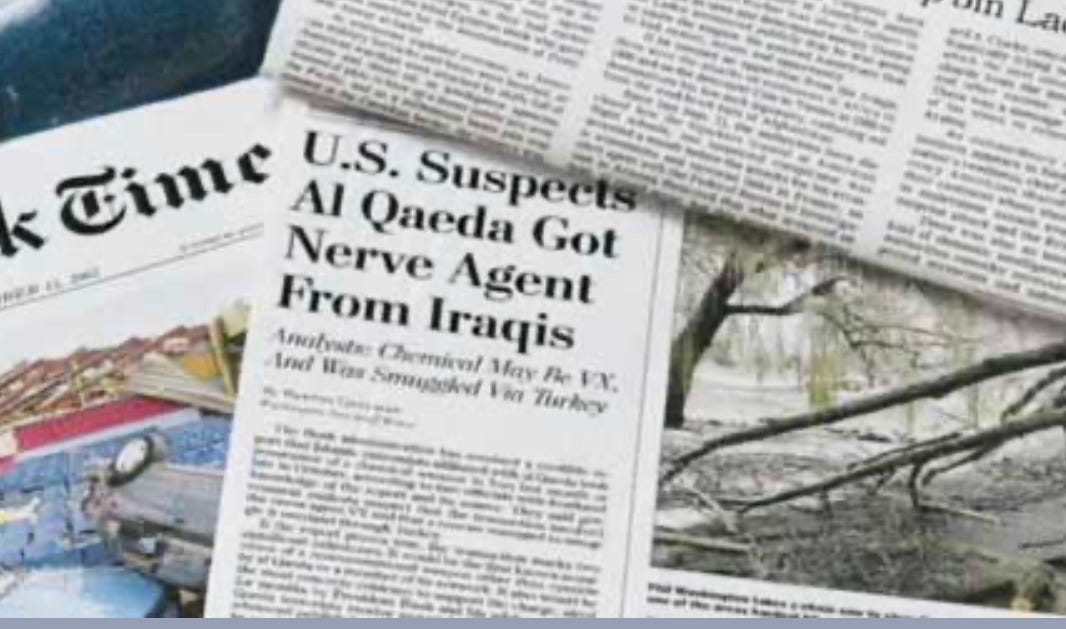Twenty years ago, before she joined Fox News and NewsMax, Judith Miller was a New York Times superstar and a Pulitzer Prize winner. More than any other reporter in America, she advanced the idea that Iraq had weapons of mass destruction that justified preemptive war. She was in the access business, and her ambition was insatiable. The simple truth is that without The New York Times and Judith Miller the pro-war ideologues would never have been successful in their misinformation strategy.
She became the conduit for all manner of politicized misinformation that asserted that Saddam Hussein had a vast arsenal of weapons of mass destruction. She was the author of dozens of stories, all based on anonymous sources that made claims that were untrue. She was manipulated by everyone from Ahmed Chalabi to Scooter Libby without much resistance. Her anonymous sources were presented to the world as credible, and their false claims were presented as cold hard facts on the front pages of The New York Times.
Here is how it would work. Bush administration officials like Scooter Libby, Donald Rumsfeld and their allies in the intelligence agencies would plant false information and “evidence” with her. That misinformation would wind up on the front page of The New York Times, and it would then be cited as evidence by other administration officials like Condoleezza Rice about the imminent danger that Saddam’s weapons posed. Rice would frequently make this point: “We don’t want the smoking gun to be a mushroom cloud.”
Judith Miller’s reporting was a disgrace —every bit as much as that of Walter Duranty. Both relied on official sources, and by doing so, they obliterated the truth as much as their sources.
Walter Duranty was another superstar New York Times reporter who misinformed the world about the millions of deaths caused by Josef Stalin’s murderous policies. Here is how The New York Times explains the Duranty disgrace today:
Duranty’s cabled dispatches had to pass Soviet censorship, and Stalin’s propaganda machine was powerful and omnipresent. Duranty’s analyses relied on official sources as his primary source of information, accounting for the most significant flaw in his coverage – his consistent underestimation of Stalin’s brutality.
Describing the Communist plan to “liquidate” the five million kulaks, relatively well-off farmers opposed to the Soviet collectivization of agriculture, Duranty wrote in 1931, for example: “Must all of them and their families be physically abolished? Of course not – they must be ‘liquidated’ or melted in the hot fire of exile and labor into the proletarian mass.”
Taking Soviet propaganda at face value this way was completely misleading, as talking with ordinary Russians might have revealed even at the time. Duranty’s prize-winning articles quoted not a single one – only Stalin, who forced farmers all over the Soviet Union into collective farms and sent those who resisted to concentration camps. Collectivization was the main cause of a famine that killed millions of people in Ukraine, the Soviet breadbasket, in 1932 and 1933 – two years after Duranty won his prize.
Even then, Duranty dismissed more diligent writers’ reports that people were starving. “Conditions are bad, but there is no famine,” he wrote in a dispatch from Moscow in March of 1933 describing the “mess” of collectivization. “But – to put it brutally – you can’t make an omelet without breaking eggs.”
Some of Duranty’s editors criticized his reporting as tendentious, but The Times kept him as a correspondent until 1941. Since the 1980’s, the paper has been publicly acknowledging his failures. Ukrainian-American and other organizations have repeatedly called on the Pulitzer Prize Board to cancel Duranty’s prize and The Times to return it, mainly on the ground of his later failure to report the famine.
The Pulitzer board has twice declined to withdraw the award, most recently in November 2003, finding “no clear and convincing evidence of deliberate deception” in the 1931 reporting that won the prize, and The Times does not have the award in its possession.





